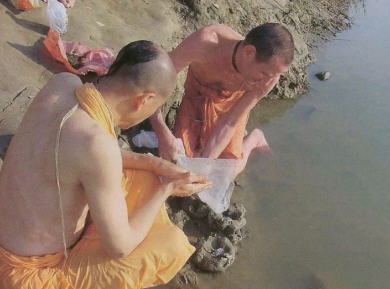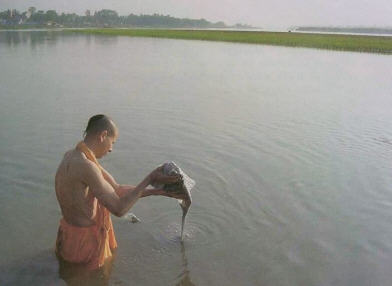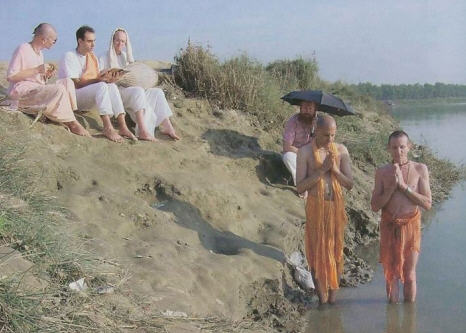A Devotee gets a second chance to say good-bye to two dear friends.
PARAM BRAHMA'S last words, spoken to his wife, were, "We'll wake up early tomorrow to perform penance and austerities."

In his usual lighthearted way, PB, as everyone called him, was referring to the next day's temple services. His wife found him the next morning dead of a massive heart attack in his sleep. He was forty-nine.
No one knows Gopa Gopesvara's last words, but they may well have been, "Hello, Sir, here's a book for you."
Two years earlier, while working as an engineer, he decided he missed distributing Srila Prabhupada's books as he had done as a young devotee in the 1970s. As a simple-living single man, the transition from professional to devotional life was easy and left him thoroughly enlivened. Strapping and healthy, he resumed book distribution with gusto, yet retained his humble, gracious charm. He died at forty-eight of a sudden cerebral hemorrhage while distributing books, just a few months after PB.
Devotees of Krsna regularly read the Bhagavad-gita's lessons about the soul: It is eternal, part of God yet distinct. The soul reincarnates life after life until resuming a loving relationship with Krsna. The self-realized person approaches death knowing that the body alone dies. Such a wise person doesn't put stock in transient material pleasures, since death will eventually steal them. "A philosopher," Srila Prabhupada told us, "keeps death in his front."
Srila Prabhupada taught by example how a devotee faces death. He endured physical meltdown without complaint and without compromise in his service to Krsna. After studying Srila Prabhupada's final months and subsequently watching other devotees display incredible strength and realization as they died of excruciating diseases I thought I knew death. Yet coming as they did less than a year apart, the abrupt deaths of these two close friends shocked me. We had no chance to say good-bye or to spend an afternoon to-gether relaxing or reading. I could not encourage them or gain strength from their courage. Then, shortly after each memorial service, the rush of life caught me up so quickly that I felt I couldn't digest the loss. What could I do?
With a trip to India coming up, and in keeping with Vaisnava tradition, I offered to take my friends' ashes to the sacred Ganga (Ganges). PB's widow, Mankumari Devi Dasi, quickly agreed. After some deliberation, Gopa Gopesvara's parents and brother accepted as well. They thanked me, and I thanked them for entrusting the task to me.
In Vaisnava society, loved ones customarily cremate the deceased in a public ceremony on the banks of a sacred river. The elder son lights the pyre and helps the corpse burn efficiently. Watching the flames consume the body sobers the audience. The Sanskrit phrase smasana vairagya ("renunciation at the burning ghat") refers to the philosophical frame of mind that grips the cremation witnesses.
Besides releasing the soul from attachment to its former body, public cremation offers the additional benefit of helping the loved ones close out their relationship with the departed. Cremations are one of the samskaras, or rites of passage, for a religious person.
Unfortunately, in America, where my two friends died, public cremations are illegal. Instead, cremations take place in closed ovens in funeral homes. I'm sure my friends would have preferred to die in a sacred place in India and be cremated at the Ganga. As things stood, I felt confident they would appreciate my efforts as the best alternative.
The Ritual
Before leaving, a friend tells me that carrying a person's ashes to the Ganga insures the carrier's protection while traveling. If nothing else, it's a comforting thought. At the airport the counter agent tells me my bags are overweight. I explain my mission and mention that my cargo is in a heavy metal urn, which I could carry on the plane if he preferred. He declines and waves me on. The blessing seems to be working. I imagine PB chuckling.

In Mayapur, the Hare Krsna world spiritual headquarters, I'm fortunate to gain the aid of two respected priests for the ceremony. Jananivasa Dasa, the senior priest in Mayapur, joins Radhanatha Swami, an ISKCON leader and close friend of PB's. Together we gather several devotees and proceed to the Ganga.
Somehow I expected we would take a boat to the center of the river and perform the ritual there, but Jananivasa directs us instead to the bank of a long island. We cross a small inlet in a low wooden boat and walk to a secluded spot on the island's far side. Jananivasa and Radhanatha Swami put on gamchas (waistcloths) and wade into the river while the rest of us perform kirtana on the bank.
In preparation, one of the devotees has gathered the necessary ingredients: honey and several products of the cow. Jananivasa calls for these items and mixes them with the ashes and sacred Ganga soil. He creates for each set of ashes a bowl out of the riverbank mud and places the mixture inside. Then he leads Radhanatha Swami in reciting mantras and prayers. The rest of us sing songs for departed Vaisnavas and watch intently.
After a few minutes the rite is complete. The priests throw the ashes as far into the river as they can. The bags drift down the river, as does the heavy metal urn, displacing enough water to reveal several inches of its shiny rim and its dark open mouth. It floats out of sight.
We all chant Hare Krsna and offer our final respects. Then we again board the shallow boat and return to the shore. Jananivasa mentions that Srila Prabhupada was more explicit about the importance of devotees' distributing a feast on the occasion of a Vaisnava's departure than about the rites connected with the ashes. Nonetheless, we all feel satisfied and fulfilled by the experience.
Reflections
Back on the ISKCON Mayapur campus, we meet Jayadvaita Swami, former editor of BTG, who once brought on PB as the magazine's circulation director. We stand in the warm winter sun and discuss the two departed Godbrothers.

Radhanatha Swami describes PB as the "General" of the New Vrindavan brahmacari ashram, where in the early seventies Radhanatha Swami got his basic Krsna conscious training. Even in the midst of the muddy farm environment, he said, PB always seemed to keep an immaculate dhoti. He was the first one out for service each day and always kept the others inspired.
I recall PB quoting Srila Prabhupada as saying, "Chant Hare Krsna and be happy."
"That was an order, not a blessing," PB would say.
And he made that his mission: to be happy always. And that's how we remember PB always smiling, upbeat and encouraging to others.
Although Gopa Gopesvara is less known to this group, everyone appreciates the remarkable determination reflected in his life and service. We remember Srila Prabhupada, quite ill toward the end of his life, asking to be allowed to "die on the battlefield." We all agree that Gopa Gopesvara was blessed and reflected his spiritual master's mood by passing from this world while distributing books.
I return to my room satisfied that I have done my duty. For me there was no epiphany at the Ganga, only a sense of doing what I knew my friends would want. When I give up this body an eventuality that suddenly seems more real may Krsna inspire someone to kindly do the same for me.
Kalakantha Dasa, author of The Song Divine (a lyrical rendition of the Bhagavad-gita), lives in Gainesville, Florida, with his wife and children. He is the resource development director for the Mayapur Project.
